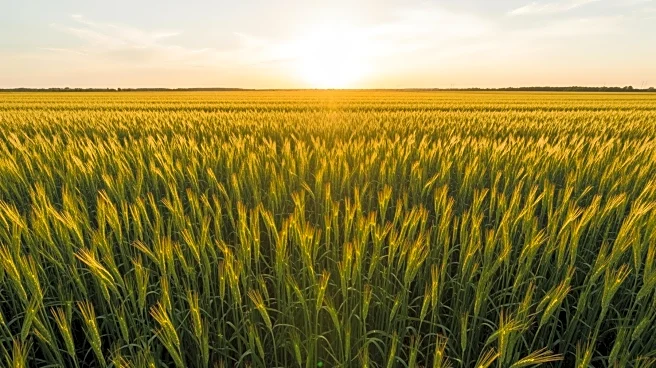What's Happening?
Plantation agriculture emerged as a significant chapter in American farming history during the 1600s and 1700s. Initially starting in Virginia, it spread to Maryland and later expanded throughout the Southern
Colonies. Historian Mark Oppold explores how plantations transformed the nation's economy, society, and agricultural identity, from the first tobacco crops to the rise of cotton cultivation in the 19th century. The plantation system laid the groundwork for the southern agricultural economy, setting a precedent for large-scale crop production that defined the region for centuries.
Why It's Important?
The rise of plantation agriculture played a crucial role in shaping the economic and social landscape of early America. It established the foundation for the Southern economy, heavily reliant on cash crops like tobacco, rice, and cotton. This system contributed to the economic expansion and settlement along the Atlantic Coast, linking the American South to global trade networks. However, it also led to increased dependence on enslaved labor, profoundly impacting social and political dynamics leading up to the Civil War. Understanding this history is essential for appreciating the complexities of American agricultural development and its lasting legacy.
What's Next?
The legacy of plantation agriculture continues to influence modern discussions about land use, labor, and economic disparity in rural America. As farming shifts towards mechanization and technology, the historical framework of plantation agriculture informs debates on sustainable practices and equitable land distribution. Future agricultural policies may focus on addressing the disparities rooted in this historical system, promoting more inclusive and sustainable farming practices. The ongoing examination of plantation agriculture's impact may also lead to increased efforts to preserve historical sites and educate the public about this critical aspect of American history.
Beyond the Headlines
The plantation model's influence extends beyond agriculture, affecting cultural and social dynamics in the U.S. It shaped land ownership patterns and rural economies, leaving a lasting impact on American society. The historical reliance on enslaved labor raises ethical considerations about the legacy of inequality and injustice. This period of agricultural evolution highlights the interconnectedness of land, labor, and economic systems, prompting discussions on how to address historical injustices and promote equitable development. The story of plantation agriculture serves as a reminder of the complex interplay between economic growth and social responsibility.










